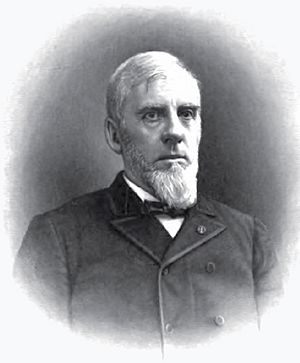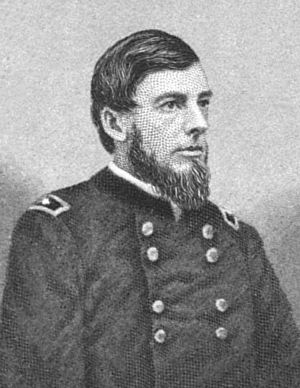Benjamin R. Cowen facts for kids
Quick facts for kids
Benjamin Rush Cowen
|
|
|---|---|
 |
|
| 13th Ohio Secretary of State | |
| In office January 1862 – May 1862 |
|
| Governor | David Tod |
| Preceded by | Addison P. Russell |
| Succeeded by | Wilson S. Kennon |
| Personal details | |
| Born | August 15, 1831 Moorefield Township, Harrison County, Ohio |
| Died | January 19, 1908 (aged 76) Cincinnati, Ohio |
| Resting place | Greenwood Cemetery, Bellaire, Ohio |
| Political party | Republican |
| Spouse | Ellen Thoburn |
| Children | eight |
| Military service | |
| Allegiance | United States |
| Branch/service | United States Army Union Army |
| Rank | |
| Battles/wars | American Civil War |
Benjamin Rush Cowen (born August 15, 1831 – died January 19, 1908) was an important figure in American history. He served as a general in the Union Army during the American Civil War. He was also a Republican politician. He even held the job of Ohio Secretary of State.
Early Life and Career
Benjamin Rush Cowen was born in Moorefield Township, Harrison County, Ohio. His father, Benjamin S. Cowen, later became a member of Congress. Benjamin grew up in St. Clairsville, Belmont County, Ohio.
He went to a special school there. He also learned about printing at a newspaper called the Belmont Chronicle. By the time he was 17, he owned and edited this newspaper! He also studied medicine, but he never worked as a doctor.
On September 19, 1854, Cowen married Ellen Thoburn. They had eight children together. In 1856, he attended a big meeting for the Republican Party. This meeting chose John C. Fremont to run for president.
In 1858, he sold his newspaper. He then worked in real estate in Bellaire. From 1860 to 1861, he was the Chief Clerk for the Ohio House of Representatives. In October 1861, he was elected as the Ohio Secretary of State. But he left this job in May 1862 to join the war effort.
Serving in the Civil War
When the Civil War began, Benjamin Rush Cowen quickly joined the Union Army. He started as a private soldier. This meant he was a regular soldier, not an officer.
He soon became a First-Lieutenant. He helped make sure soldiers had enough food and supplies. Later, he became a paymaster. This job meant he was in charge of paying the soldiers. He even helped send money from soldiers to their families back home.
In 1864, he became the Adjutant-General of Ohio. This was a very important role. He helped organize, equip, and send Ohio troops to the battlefield. Because of his excellent work, he was given special honors. He was promoted to Brevet Lieutenant Colonel, Brevet Colonel, and then Brevet Brigadier-General. A "brevet" rank is an honorary promotion. It means he was recognized for his brave and important service.
President Andrew Johnson officially recognized his brevet rank in 1866.
Life After the War
After the war, Cowen continued his public service. In 1867, he tried to become the Governor of Ohio. He lost to General Rutherford B. Hayes. He was offered the job of lieutenant-governor, but he said no.
In 1868, he was a delegate at the Republican National Convention. This is where the party chooses its presidential candidate.
From 1871 to 1876, he worked as the assistant secretary of the interior. This was under President Ulysses S. Grant. President Grant gave Cowen many special tasks. One of his most notable achievements was helping to establish Yellowstone National Park. This park is now famous around the world!
After his government service, Cowen worked in business. He also became an editor for the Ohio State Journal newspaper. Later, he worked for the United States courts in Ohio. He often gave speeches about history and patriotism.
Benjamin Rush Cowen passed away in Cincinnati on January 19, 1908. He was buried in Greenwood Cemetery in Bellaire.


